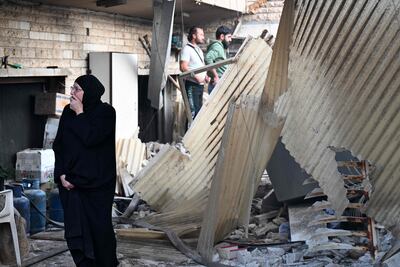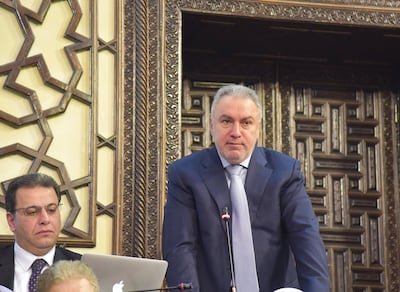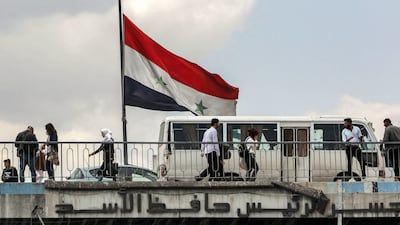Syria's parliament has expelled or stripped immunity from a number of wealthy members who built their fortunes during the ongoing civil war, raising questions about political balances in the country and sparking speculation about potential shifts within its power structure and the external relations of the ruling elite.
Diplomats, bankers, businessmen and local sources told The National that these actions may be driven by Syria’s attempt to re-establish diplomatic ties with European countries amid the ongoing conflict between Israel and Iran and its regional proxies entrenched in Syria, with some of the businessmen linked to Tehran.
Traditionally, membership of the 250-seat legislature is reserved for regime loyalists, including figures in a new class of war profiteers who continue to thrive despite the economic collapse affecting most of the country.
Official Syrian media reported last week that the parliament, which lacks any opposition representation, had permitted “judicial prosecutions” against two members. This brought the total number of MPs who have either lost their membership or parliamentary immunity since last month to seven, some of whom are under US sanctions.
The wealthiest of the seven, Mohammed Hamsho, is linked to President Bashar Al Assad's younger brother Brig Gen Maher Al Assad who is regarded by many diplomats and experts in Syrian affairs as the primary facilitator of Iranian operations in Syria.
Two of the MPs are figures in militias operating in areas under Brig Gen Al Assad's control, according to Syrian and Lebanese bankers familiar with their activities, local sources in the areas where they operate, and western diplomatic sources monitoring the business sector in regime-held areas as part of sanctions enforcement.
Two others have extensive business ties to Tehran and rely on its proxies in Syria, according to diplomats familiar with the country's political apparatus, regional businessmen connected to Syria's economy, and Syrian opposition figures in Amman.
The remaining MPs hold little known political significance.
Syria has been embroiled in civil war since 2011, following the suppression of a peaceful protest movement calling for the removal of Mr Al Assad, and subsequent fighting against extremist groups such as ISIS. The war economy has generated billions of dollars, particularly through the illegal drug trade.
It has also provided Tehran with a significant foothold in Syria through its proxy militias, primarily the Lebanese militant group Hezbollah, which has fought alongside Syrian armed forces. The Islamic Republic has deployed proxy militias that, together with its Islamic Revolutionary Guard Corps (IRGC), control a corridor from Iraq to the Lebanese border, primarily supplying Hezbollah with weapons.
Miscalculation or strategic move?
In recent weeks, several areas of Syria, including the capital Damascus, have been targeted by Israel after it escalated its fight against Hezbollah, which started attacking northern Israel after the war in Gaza broke out in October last year, leading to an all-out conflict in Lebanon against the Iran-backed armed group.
Elite Syrian army and intelligence units, which underpin the ruling system, have also come under attack by Israel in the past several months. This has put pressure on the alliance between Damascus and Tehran, although the Syrian government has tried to distance itself from attacks emanating from Syria by Iran's militia allies on Israeli targets.
Two European diplomats whose brief covers Syria told The National that actions by the power circle close to President Bashar Al Assad in the parliament appear to have been mainly motivated by Israeli and US discussions about offering Damascus incentives for distancing itself from Tehran.
One of the diplomats has worked on the Syria file for the last 15 years and participated in various back-channel efforts to end the civil war. The other has been playing a role in his country's efforts to re-establish ties with Damascus and recently met unsanctioned Syrian businessmen who still travel between Syria and Europe.

The two diplomats suggested the move might have been miscalculated, as Donald Trump’s November 5 election victory would likely reduce the chances of a deal in the near future.
While the diplomats did not rule out a potential agreement with Damascus under the new administration, they believe it would take time for Mr Trump to establish a Syria policy. They pointed out that, in his previous term, he had taken a firm stance, authorising a strike on the Syrian military in 2017 in response to a suspected chemical attack on a rebel-held town.
If the move does not open a window with the US soon, then Mr Al Assad will have "to justify his actions against the Iranians, even if he stops the moves against the parliamentarians,” one of the diplomats said. “The damage is done," he added.
A rift between Damascus and Tehran could deprive Iran of a crucial advantage in its conflict with Israel and strengthen Israel in its war with Hezbollah. But there has been no sign of any significant curbs on the activities of Iran and its militant proxies in Syria.
Syria and Iran have maintained a strong strategic alliance since the 1979 revolution. Syria’s support for Shiite Iran under President Hafez Al Assad during the Iran war with Sunni-ruled Iraq war was a significant display of this alliance, as it was one of the few Arab countries to side with Iran, straining its relationships with many countries in the region. Syria has been dominated by members of the Alawite sect, an offshoot of Shiism, since 1963 coup.
“There is deep conviction among the top of the regime that without Iran, they would not have survived. Any move [Bashar] Al Assad makes that appears to be against the Iranians will have a revolving door to let them back in,” a member of the Syrian opposition said.
Last week The Washington Post quoted an anonymous US source as saying that Washington and Israel were seeking assistance from Mr Al Assad to stop cross-border supplies to Hezbollah. The source said that Mr Al Assad may be open to co-operation to limit Iran's powerful presence. Another Israeli source told the outlet that the US would give the Syrian leader unspecified benefits if he turned against Iran.
In a potential sign of the US and its allies' desire to distance Mr Al Assad from Tehran, their alliance was a prominent topic in a surprise meeting between Jordanian Foreign Minister Ayman Safadi and the Syrian President in Damascus on October 21, according to another diplomatic source. Two days later, Syrian official media announced that the parliament had expelled Mr Hamsho, a close business associate of Brig Gen Al Assad since the early 2000s.
Encouraging diplomatic overtures
Several of the diplomats, businessmen, and bankers interviewed by The National suggested that the move against the MPs is also aimed at encouraging diplomatic overtures to Damascus from some European countries, particularly Italy, with the goal of facilitating the return of Syrian refugees who had fled to Europe.
In July, Italy appointed Stefano Ravagnan as ambassador to Syria, breaking with a policy of the major European powers of maintaining isolation toward Damascus. Diplomats say, however, that there have been no immediate concrete offers of financial assistance to Damascus.
The Syrian pound has lost almost all of its value, falling to 15,000 to the dollar compared with 50 pounds when the uprising began in March 2011. Despite pressure from Russia, which intervened militarily on the side of Damascus in 2015, neither Arab nor European countries have contributed any significant financing to reconstruction in regime-held areas, which could help mend the economy and provide a war dividend.
Ayman Abdel Nour, a veteran Syrian political commentator who worked with Mr Al Assad on reforms before leaving Syria in the 2000s, said the recent action against MPs appeared to be designed to “disengage Bashar” from the lawlessness and militia rule pervading the country, as western powers seek to accommodate him.
“Bashar wants to show that they (the militia) are the ones responsible [for transgressions] in the hope of receiving European money flows. He is portraying himself as the head of a counter-campaign,” Mr Abdel Nour told The National.

According to the member of the Syrian opposition who knew Brig Gen Al Assad before defecting from the military a decade ago, the President's brother would not mind sacrificing Mr Hamsho if it helped “polish the regime's image” in front of potential European donors.
Mr Hamsho is one of two MPs regarded as major players in the economy within government-controlled areas. His company, Hamsho International Group, operates across various sectors, and he is either the owner or a major shareholder in several companies. When imposing sanctions on him in 2011, the US Treasury Department described him as a close associate of Brig Gen Al Assad, acting as a frontman for him and several of his business ventures.
The next most powerful MP to face ejection was Khaled Zubaidi, who was sanctioned by the US Treasury in 2020 for “having materially assisted, sponsored or provided financial, material or technological support for, or goods and services in support of, the government of Syria”. He is involved in finance and real estate through Aqar Investment and the Zubaidi Development Company. In 2018, he obtained a concession from the government to develop Grand Town Tourist City, a luxury real estate project on the edge of the Saida Zainab district, a stronghold of Hezbollah and the IRGC.
A lesser-known MP facing possible legal action is Madloul Al Aziz, who said on Facebook in June that he has been accused of smuggling weapons, oil and other contraband. He operates in Deir Ezzor in eastern Syria, another part of Iran's control zone. Two other MPs, Ayham Grikos and Mujahed Ismail, command militias that operate in areas where the elite Fourth Armoured Division headed by Brig Gen Al Assad is based.
Jihad Yazigi, editor and publisher of the online publication The Syria Report, said there was as yet “not enough indication” to conclude a shift within the power structure. He cautioned that the moves against Mr Hamsho and other MPs might not necessarily signify a rift between the President and his powerful brother, highlighting past instances of legal action against regime loyalists that did not lead to punishment.
“Even if someone like Hamsho gets arrested, it is not a test that the moves are serious,” Mr Yazigi said. However, he asked, “Is the Fourth Division losing assets and privileges? This would mean a big thing, signalling some rift."


